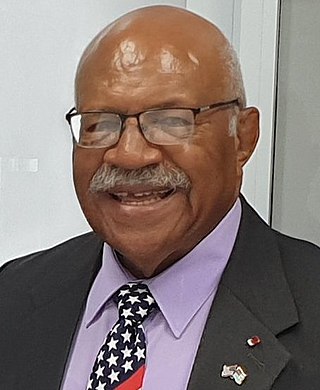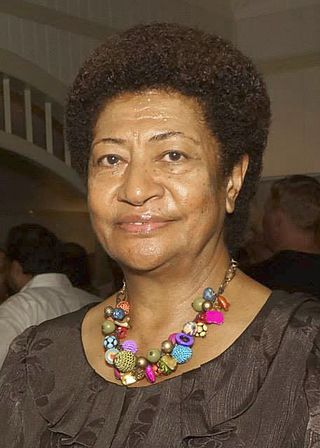
The United Fiji Party was a political party in Fiji. It was founded in 2001 by Prime Minister Laisenia Qarase as a power base; it absorbed most of the Christian Democratic Alliance and other conservative groups, and its endorsement by the Great Council of Chiefs (Bose Levu Vakaturaga) caused it to be widely seen as the successor to the Alliance Party, the former ruling party that had dominated Fijian politics from the 1960s to the 1980s. It drew its support mainly from indigenous Fijiians.

Sitiveni Ligamamada Rabuka is a Fijian politician who has served as Prime Minister of Fiji since 24 December 2022. He was the instigator of two military coups in 1987. He was democratically elected as Prime Minister of Fiji, serving from 1992 to 1999, and again in 2022, leading a three-party coalition. He also served as Chairman of the Great Council of Chiefs from 1999 to 2001, and later as Chairman of the Cakaudrove Provincial Council from 2001 to 2008.

The National Federation Party is a Fijian political party founded by A.D. Patel in November 1968, as a merger of the Federation Party and the National Democratic Party. Though it claims to represent all Fiji Islanders, it is supported, in practice, almost exclusively by Indo-Fijians whose ancestors had come to Fiji between 1879 and 1916, mostly as indentured labourers. However, in the 2018 general election, the party recorded a considerable change in its support base due to the inclusion of more indigenous Fijian candidates.

The Conservative Alliance was a right-wing political party in Fiji, and a member of the ruling coalition government. It was commonly known as the CAMV, a combination of the initials of its English and Fijian names. At its annual general meeting on 17 February 2006, the party voted to dissolve itself and merge with its coalition partner, the Soqosoqo Duavata ni Lewenivanua (SDL). The President of the party at the time of its dissolution was Ratu Tanoa Cakobau, a Bauan chief, while Ratu Josefa Dimuri served as General Secretary. For legal reasons, Parliamentary members of the disbanded party maintained a separate caucus in the House of Representatives, under the leadership of Ratu Naiqama Lalabalavu, until the end of the parliamentary term, on 27 March 2006.

The National Alliance Party of Fiji (NAPF) was a Fijian political party. It was formally registered on 18 January 2005 by Ratu Epeli Ganilau, as the claimed successor to the defunct Alliance Party, which ruled Fiji from 1967 to 1987 under the leadership of the late Ratu Sir Kamisese Mara, Ganilau's father-in-law. Others involved with the party included university lecturer Meli Waqa as party secretary, and Manu Korovulavula as treasurer. The Deputy Leader was Hirdesh Sharma. The party was launched publicly at a mass rally in Suva on 8 April 2005.

The Fijian Association Party (FAP) is a former political party in Fiji. It played a significant role in Fijian politics throughout the 1990s, but lost all of its seats in the House of Representatives in the parliamentary election of 2001.

Ro Teimumu Vuikaba Kepa is a Fijian chief, former Member of the Parliament of Fiji, and former leader of the Social Democratic Liberal Party. She was the first Fijian woman to serve as Leader of the Opposition. She previously held the position of deputy Prime Minister in the Qarase-led Soqosoqo Duavata ni Lewenivanua (SDL) government from 2001 to 2006. As the paramount chief of the Burebasaga Confederacy, she holds the title Roko Tui Dreketi.

The Christian Democratic Alliance, better known locally by its Fijian name, Veitokani ni Lewenivanua Vakarisito (VLV), was a Fijian political party that operated in the late 1990s and early 2000s.
Ratu Cokanauto Tu'uakitau is a Fijian chief and politician. He is the scion of a distinguished family, as a son of Ratu Sir Edward Cakobau, and brother of Ratu Epeli Nailatikau, who has served as President of Fiji since 2009.
Niko Nawaikula also known as Nikolau Tuiqamea, is a Fijian lawyer, and a former member of the Parliament of Fiji. He is a member of the Social Democratic Liberal Party. In May 2022 he was convicted of giving false information and obtaining a financial advantage and sentenced to three years imprisonment.

The People's National Party (PNP) is a former Fijian political party.

The Grand Coalition for Fiji, formerly known as the Grand Coalition Initiative Group, was a coalition of five predominantly indigenous Fijian political parties in Fiji, forged for the purpose of contesting the general election scheduled for 2006 under a single umbrella and forming a coalition government subsequently. Efforts to unite the ethnic Fijian parties were in part a response to their electoral defeat in 1999, when they had been split, enabling the Indian-backed FLP to win a landslide victory. Nevertheless, Tomasi Vakatora, the chairman of the Grand Coalition, publicly stated in February 2006 that it was open to sharing preferences with the predominantly Indian parties. By the time of the election, however, the coalition was virtually defunct.

General elections were held in Fiji between 6 and 13 May 2006.
Ted Young is a Fijian politician, who served in the Cabinet of Prime Minister Laisenia Qarase from 2001 to 2006. He was Minister for Regional Development from 2001 to 2006, when he became Minister of State for Provincial Development. He represented the Lomaivuna Namosi Kadavu Open Constituency, which he won on the Soqosoqo Duavata ni Lewenivanua (SDL) ticket in the general election of September 2001, defeating Samuela Nawalowalo of the Soqosoqo ni Vakavulewa ni Taukei (SVT). He had previously sought to win the seat at the 1999 election, for the Fijian Association Party (FAP), but was defeated by Konisi Yabaki of the Soqosoqo ni Vakavulewa ni Taukei (SVT)..
Cakaudrove is one of fourteen provinces of Fiji, and one of three based principally on the northern island of Vanua Levu, occupying the south-eastern third of the island and including the nearby islands of Taveuni, Rabi, Kioa, and numerous other islands in the Vanua Levu Group. It has a total land area of 2,816 square kilometers, with a population of 50,469 at the most recent census in 2017, making it the seventh most populous province. The only major town is Savusavu, with a population of 3,372 in 2007.
Isireli Leweniqila is a former Fijian politician, who served in the Cabinet as Minister for Information and Communications.
Manasa Tugia is a former Fijian politician, who served as Deputy Speaker of the House of Representatives from 2005 to 2006, and as Chairman of Parliament's Justice, Law, and Order Committee. In the latter role, he coordinated hearings into the government's controversial Reconciliation, Tolerance, and Unity (RTU) Bill).
Josateki Vula is a former Fijian politician, who served in the House of Representatives from 2001 to 2006. He represented the Bua Fijian Communal Constituency, which he won for the Conservative Alliance (CAMV) in the parliamentary election of September 2001, defeating the incumbent, Mitieli Bulanauca of the Soqosoqo Duavata ni Lewenivanua Party (SDL). He was the only Conservative Alliance MP who had not been charged over the 2000 Fijian coup d'état.
Ratu Aisea Cavunailoa Katonivere was a Fijian chief and politician who hailed from the chiefly village of Naduri from the northern Province of Macuata, where he was the Paramount Chief and Chairman of the Provincial Council. He held the title of Caumatalevu na Turaga na Tui Macuata, which is usually abbreviated to Tui Macuata.





